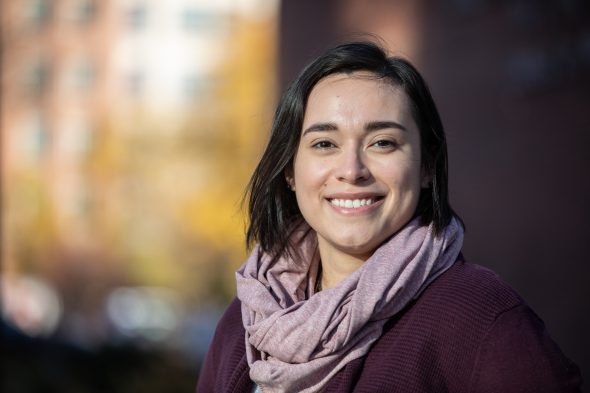Inspiring grads: Amanda Treviño
By Deborah Ziff Soriano
At 5:30 a.m. most Wednesdays, UIC Nursing student Amanda Treviño is at the South Loop Greyhound bus station, just east of the UIC campus.
She’s there before the sun rises to assemble backpacks full of essential items — water, soap, toothbrushes and more — which she will bring to greet asylum-seekers arriving on the 6:45 a.m. bus.
Treviño, a student in the Advanced Generalist Master of Science program who graduates this month, started going to the station in spring 2021 and continued through the summer as a student in professor Gerry Gorman’s community clinical rotation.
But even after the rotation ended, Treviño kept returning.
“Everything is new for them when they get here,” she said. “It’s a strange country with a language they may not know. We’re providing one moment of kindness, one moment of generosity, in which we’re essentially acknowledging our [shared] humanity.”
Many of the immigrants arrive after riding the bus across the country, having just been released from detention centers near the Mexico border. They may carry only a plastic bag and a folder of documents; some have just the clothes they’re wearing. Chicago may be the travelers’ destination, or it may be a brief stop on a journey to another location.
Treviño’s volunteer work is part of the Chicago Immigrant Transit Assistance program, operated by the Chicago-based Interfaith Community for Detained Immigrants. Treviño, who grew up as the daughter of Mexican immigrants in the Hermosa neighborhood on Chicago’s Northwest Side, is fluent in Spanish and has taken on a preceptor role with the program.
“What was really wonderful was Amanda started volunteering to be at the bus station every week for new students, so she could orient them and translate for them,” Gorman said. “She was there every week providing that guidance. She put in way more hours than she was able to count toward required clinical experience.”
Treviño helped orient new UIC Nursing students virtually and is also orienting nursing students from DePaul University in person who are rotating in the CITA program.
Besides personal hygiene items, Treviño and the other volunteers give out bags for children with small toys, coloring books and a stuffed animal. They also distribute over-the-counter medicine, disposable phones or SIM cards, and “Know your Rights” information.
“I always feel like there’s a sense of relief, especially when I approach them saying, ‘We have food and water for you. Do you need help? Do you need a change of clothes?’” Treviño said.
The interactions are short — most of the time the immigrants are on their way again by 9 a.m. — but Treviño said she and the other volunteers can offer a hot meal, winter clothes, directions to their next bus, help contacting family, and sometimes a cab ride or hotel stay if needed.
While not all the travelers need medical care, some do.
“We try to help them as much as possible,” Treviño said. “Infections can spread in closed spaces. People come in with colds and coughs. We try to keep medicine in stock for anyone who needs it.”
During her volunteer work, Treviño said she also gained a deeper insight into her own family history, learning that her grandparents also helped bring Mexican immigrants to the U.S. When she graduates, she’s hoping to gain experience as a nurse in an ICU or trauma unit before pursuing work with a humanitarian organization like Doctors Without Borders.
“Nursing isn’t just about passing out meds, making diagnoses, looking out for symptoms and adverse reactions,” Treviño said. “It’s also about making sure our patients feel like human beings, that they’re respected and listened to.”

